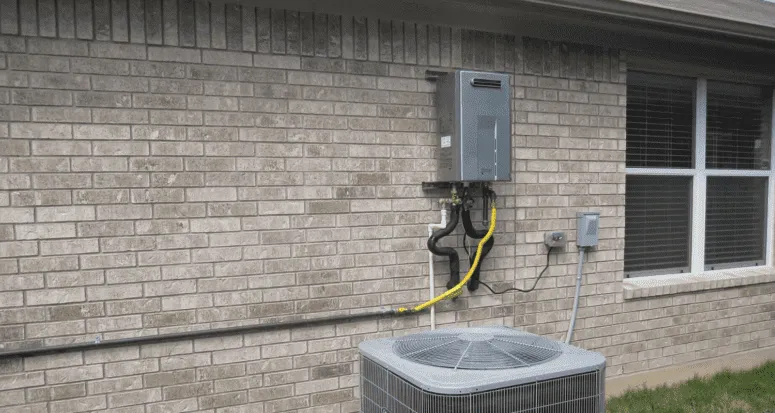To save money on heating bills in Washington State, set your thermostat to 68°F, seal air leaks, and improve home insulation. Upgrading to energy-efficient systems like heat pumps and using smart thermostats can reduce costs by up to 30%. Regular maintenance also keeps your heating system running efficiently.
Keeping your home warm during Washington’s chilly winters doesn’t have to break the bank. By making smart choices, you can cut heating costs without compromising on comfort. This guide will walk you through practical and effective strategies to save money on heating bills.
Understanding Heating Costs in Washington State
In Washington, most households rely on electricity (59.7%) or natural gas (32.5%) for heating, according to the U.S. Energy Information Administration. Rising energy prices and inefficient systems often lead to high heating bills. Additionally, cold winters and outdated insulation can further drive up energy consumption. Addressing these issues can help you save significantly.
Upgrade to Energy-Efficient Heating Systems
Switching to an energy-efficient system is one of the best ways to reduce your bills.
Why Upgrade?
Modern heating systems, such as heat pumps or high-efficiency furnaces, consume significantly less energy. For example, a high-efficiency furnace can save up to 30% on energy usage compared to older models. Heat pumps, with efficiency rates of over 300%, are particularly ideal for Washington’s moderate winters.
When to Replace Your Heating System
If your current system is more than 15 years old or requires frequent repairs, consider an upgrade. Visit HVACation’s heating installation page to explore modern options.
Optimize Your Heating System’s Performance
Even the most efficient systems need proper maintenance to perform their best.
- Replace Filters: Dirty filters reduce efficiency and increase energy use. Change filters every 1-3 months.
- Inspect and Seal Ductwork: Leaky ducts waste heat. Sealing them can save up to 20% on energy bills.
- Schedule Regular Maintenance: Professional tune-ups keep your system running efficiently. Learn more about heating maintenance at HVACation.
Use Smart Thermostats for Precision Control
Smart thermostats are an excellent way to manage heating costs. These devices learn your schedule and adjust temperatures automatically, ensuring you don’t waste energy when you’re away.
Benefits of Smart Thermostats
- Lower Costs: Reduce heating bills by up to 10% annually.
- Remote Control: Adjust settings from anywhere via smartphone.
- Energy Insights: Get reports on usage patterns to optimize savings.
Explore more about choosing a smart thermostat here.
Improve Your Home’s Insulation
Proper insulation prevents heat loss, keeping your home warmer for less energy.
Focus on Key Areas
- Attics: Heat rises, making the attic a critical area for insulation.
- Walls and Floors: Insulating these areas can cut energy use by 15%.
- Windows and Doors: Seal gaps with weatherstripping or caulk to block drafts.
Investing in insulation upgrades can lower your heating bills significantly over time.
DIY Strategies to Lower Heating Bills
You don’t need to make major changes to see a difference. Try these simple fixes:
- Use Door Sweeps: Block cold air from entering under doors.
- Install Thermal Curtains: Keep heat inside and reduce drafts from windows.
- Close Unused Rooms: Direct heat only to areas you use frequently.
- Wear Layers Indoors: Lower the thermostat by a few degrees and bundle up.
These small steps can add up to big savings.
Water Heating Tips to Save More
Water heating is another major energy expense in most homes. You can reduce these costs by:
- Lowering the Temperature: Set your water heater to 120°F for optimal efficiency.
- Using Insulation: Wrap the water heater tank and pipes to prevent heat loss.
- Upgrading Appliances: Replace old dishwashers and washing machines with Energy Star models.
These measures can save you up to 20% on water heating expenses annually.
Leverage Renewable Energy Options
Washington leads the nation in renewable energy, thanks to its abundant hydropower. Installing solar panels can further offset heating costs, especially with state incentives and net metering programs.
Why Go Solar?
Solar power reduces reliance on the grid and lowers electricity bills. For example, a typical rooftop solar system can save homeowners hundreds of dollars annually.
Learn more about the environmental benefits of renewable energy systems here.
Prevent Expensive Heating Repairs
Timely maintenance not only keeps your system efficient but also prevents costly repairs.
Common Warning Signs
- Uneven heating across rooms.
- Unusual noises or odors from the system.
- Rising energy bills despite regular usage.
For repairs, trust the experts at HVACation.
Commercial Properties: Reduce Heating Costs
Businesses can also cut energy expenses with the right strategies.
Best Practices for Businesses
- HVAC Zoning: Control temperatures in specific areas to avoid wasting energy.
- Smart Scheduling: Automate heating based on business hours.
- Regular Servicing: Prevent downtime with proactive maintenance.
For tailored solutions, visit HVACation’s Commercial Plumbing Services.
Final Thoughts
With smart planning and professional help, saving money on heating bills in Washington is within reach. From upgrading systems to simple DIY fixes, these strategies can make a noticeable difference. Stay warm this winter while keeping costs low.



